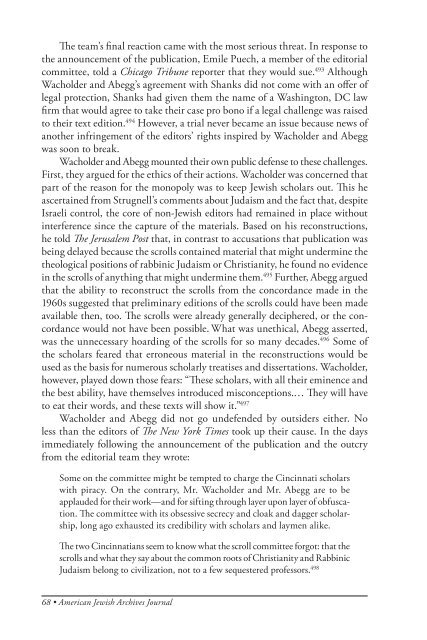The American Jewish Archives Journal, Volume LXI 2009, Number 1
The American Jewish Archives Journal, Volume LXI 2009, Number 1
The American Jewish Archives Journal, Volume LXI 2009, Number 1
You also want an ePaper? Increase the reach of your titles
YUMPU automatically turns print PDFs into web optimized ePapers that Google loves.
<strong>The</strong> team’s final reaction came with the most serious threat. In response to<br />
the announcement of the publication, Emile Puech, a member of the editorial<br />
committee, told a Chicago Tribune reporter that they would sue. 493 Although<br />
Wacholder and Abegg’s agreement with Shanks did not come with an offer of<br />
legal protection, Shanks had given them the name of a Washington, DC law<br />
firm that would agree to take their case pro bono if a legal challenge was raised<br />
to their text edition. 494 However, a trial never became an issue because news of<br />
another infringement of the editors’ rights inspired by Wacholder and Abegg<br />
was soon to break.<br />
Wacholder and Abegg mounted their own public defense to these challenges.<br />
First, they argued for the ethics of their actions. Wacholder was concerned that<br />
part of the reason for the monopoly was to keep <strong>Jewish</strong> scholars out. This he<br />
ascertained from Strugnell’s comments about Judaism and the fact that, despite<br />
Israeli control, the core of non-<strong>Jewish</strong> editors had remained in place without<br />
interference since the capture of the materials. Based on his reconstructions,<br />
he told <strong>The</strong> Jerusalem Post that, in contrast to accusations that publication was<br />
being delayed because the scrolls contained material that might undermine the<br />
theological positions of rabbinic Judaism or Christianity, he found no evidence<br />
in the scrolls of anything that might undermine them. 495 Further, Abegg argued<br />
that the ability to reconstruct the scrolls from the concordance made in the<br />
1960s suggested that preliminary editions of the scrolls could have been made<br />
available then, too. <strong>The</strong> scrolls were already generally deciphered, or the concordance<br />
would not have been possible. What was unethical, Abegg asserted,<br />
was the unnecessary hoarding of the scrolls for so many decades. 496 Some of<br />
the scholars feared that erroneous material in the reconstructions would be<br />
used as the basis for numerous scholarly treatises and dissertations. Wacholder,<br />
however, played down those fears: “<strong>The</strong>se scholars, with all their eminence and<br />
the best ability, have themselves introduced misconceptions.… <strong>The</strong>y will have<br />
to eat their words, and these texts will show it.” 497<br />
Wacholder and Abegg did not go undefended by outsiders either. No<br />
less than the editors of <strong>The</strong> New York Times took up their cause. In the days<br />
immediately following the announcement of the publication and the outcry<br />
from the editorial team they wrote:<br />
Some on the committee might be tempted to charge the Cincinnati scholars<br />
with piracy. On the contrary, Mr. Wacholder and Mr. Abegg are to be<br />
applauded for their work—and for sifting through layer upon layer of obfuscation.<br />
<strong>The</strong> committee with its obsessive secrecy and cloak and dagger scholarship,<br />
long ago exhausted its credibility with scholars and laymen alike.<br />
<strong>The</strong> two Cincinnatians seem to know what the scroll committee forgot: that the<br />
scrolls and what they say about the common roots of Christianity and Rabbinic<br />
Judaism belong to civilization, not to a few sequestered professors. 498<br />
68 • <strong>American</strong> <strong>Jewish</strong> <strong>Archives</strong> <strong>Journal</strong>

















